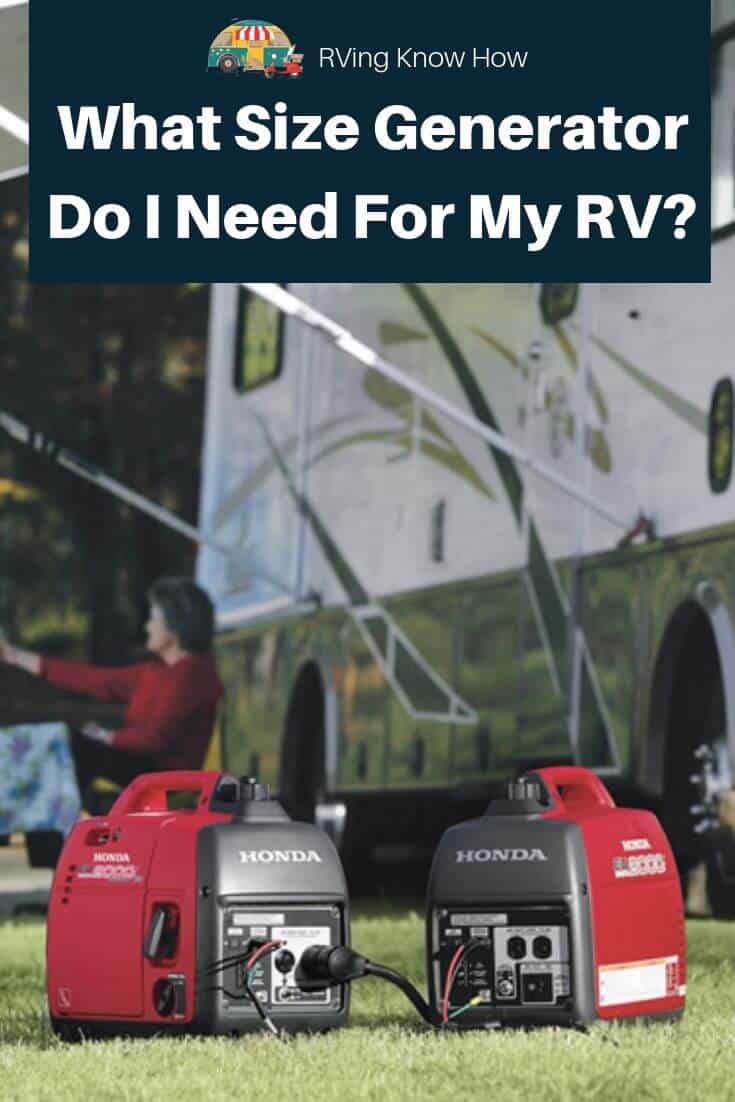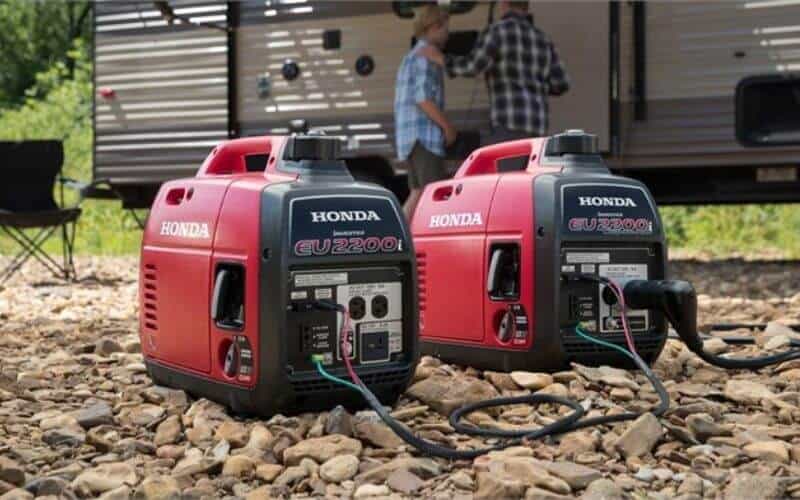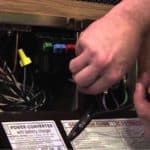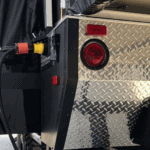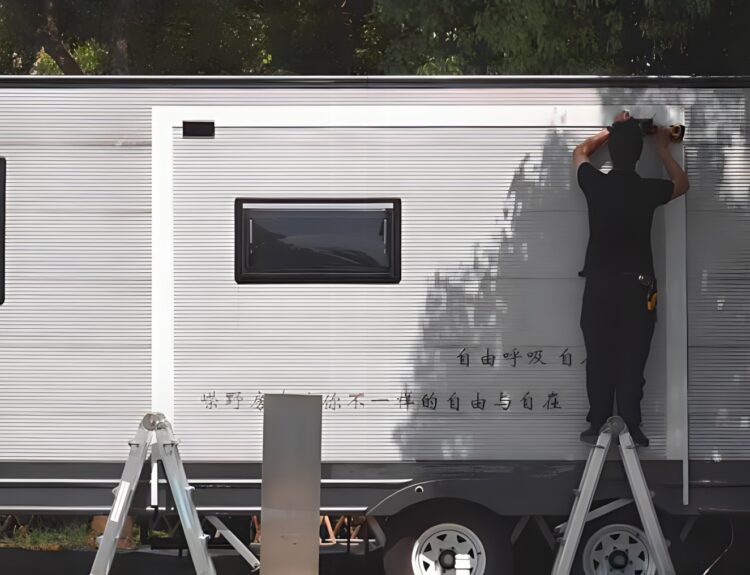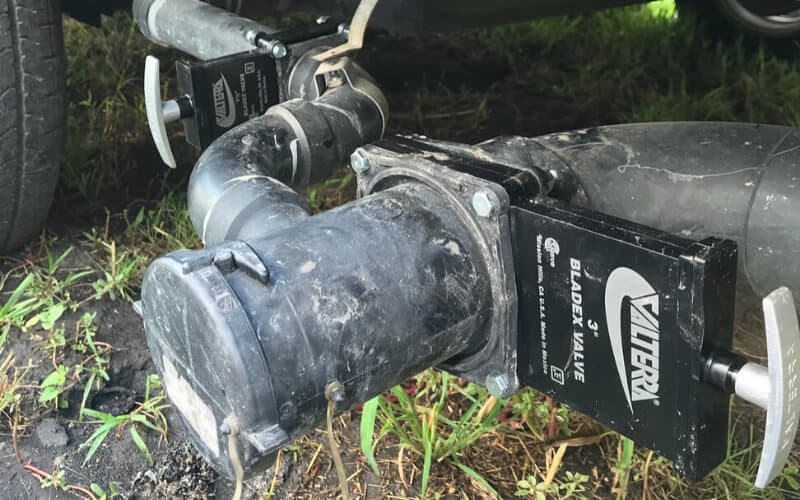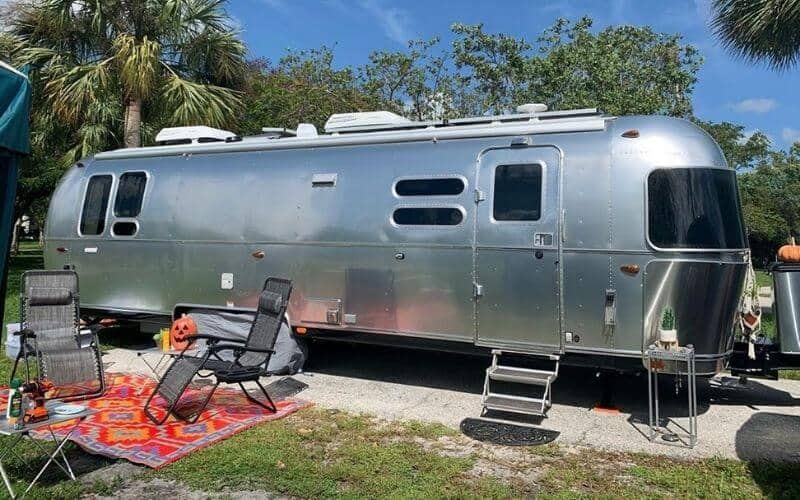Having your own travel trailer, motorhome, or RV opens up worlds of adventure. Being able to take the comforts of home with you on the road usually requires electricity.
Some of the most common questions you might ask yourself before buying a generator for your RV or camper are:
How much electricity do I need? how big of a generator do I need? What size generator is enough to run a RV air conditioner? Could I power an entire RV with it? How many watts do I need to power my refrigerator/microwave/laptop?
If you want a generator that’s prepared to keep up with your power needs, it’s important to choose the right size of a generator.
So, what size generator for an RV?
The size of your RV, the number of appliances you intend to run at one time, will determine how big a generator you need. In general a generator rated at 3,000 to 4,000 watts should be sufficient. However, it’s best to calculate your approximate usage. For instance, if your air conditioner uses anywhere from 2000 to 3500 starting watts and additional 800 to 1000 watts for running other appliances and equipment a 4,000 watt RV generator would be ideal.
In this article, we’ll explore the various electrical options for RV’s. We’ll also shed some light on how to evaluate your energy needs, and tips for finding the right generator for you.
How Much Electricity Do I Need In My RV?
This can be a little bit of a tricky question. It harkens back to junior high school classes where you had to write a paper about what three items you’d choose to live on a desert island.
Just like those theoretical social studies class scenarios, the answer requires you to embrace a little bit of a thought experiment.
Afterall, the last thing you want to do is invest a big pile of money in a generator, only to find out later that it can’t supply you with all the power you need.
Try to imagine your standard day in your RV, motorhome, or travel trailer. You get up, stretch, maybe put on a pot of coffee. Other than a percolator or a French press, most coffee makers take a fair amount of electricity.
The owner’s manual can help you, but the average coffee maker uses between 300 to 600 Watts to make 2 cups of coffee. A larger unit might use 1000 to 1500 Watts for 8-10 cups.
As the summer sun starts to beam on the RV, you might need to turn on the air conditioning. Most RV AC units use between 2,000 to 5,000 Watts.
However, there are some larger units out there that can need much more power than that.
It’s also worth bearing in mind that an air conditioner uses significantly more power at start-up than it does while running.
Once you have an idea of the Wattage used by the things you enjoy in an average day, you can start factoring it into the type of camping or travel style that fits best for you.
What Is Dry Camping?
This term refers to camping or staying “Off the grid.” Rustic and primitive campgrounds rarely have 110 Volt power available.
Sometimes you might just want to camp at the side of the road, or a wide-open field where you can look up at the starry sky.
It represents a scenario where you will be most reliant on your generator and as well as any onboard water storage.
If you think you will be dry camping a lot, then you might want to prioritize a generator at the top end of your range.
If you are buying a new RV or a previously used motorhome from a dealer, you might want to ask if you can upgrade the generator for a modest additional fee.
What Is Glamping?
Glamour camping of “Glamping” likely represents the other end of the spectrum.
In these situations, you will be staying in a high-end RV park where you will have access to all the 110 Volt standard AC electricity of the traditional power grid.
If this is more your style of travel/camping, then you can probably get away with a generator that is a little on the smaller end of your range.
How Do I Determine How Much Power I Need?
A lot of high-end motorhomes and fifth wheels already come with a generator that the manufacturer selected for its ability to provide power to everything that comes standard.
If you are installing a new generator or you want an aftermarket generator for a travel trailer, then you are probably looking for a portable generator.
You can then use the wattage you intend to use to help get a better gauge of the Amps you need. There’s a little bit of math in this, but the general range is:
- 20 amps multiplied by 120 volts = 2,400 watts
- 30 amps multiplied by 120 volts = 3,600 watts
- 50 amps multiplied by 120 volts = 6,000 watts
If you are replacing an old generator or replacing it with a higher amp level, you will likely need to install a new adaptor.
How Much Power Does An RV Air Conditioner Use?
As we discussed earlier, your RV’s air conditioner is likely going to use the most wattage.
if you can’t find a stamped plate or pad somewhere that tells you the wattage at start-up and running, you can always turn to the owner’s manual.
Now I know that some owner’s manuals just have a knack for disappearing. When you go looking for them, they are more elusive than a sasquatch in a pine forest!
The following is a basic guideline for the BTUs an air conditioner uses at startup as well as when it’s in continuous use.
What Generator Size Is Needed To Power An RV Air Conditioner?
| RV Air Conditioner Size | Approximate Wattage Draw | Approximate Running Watts |
|---|---|---|
| 7000 BTU | 1700 Watts | 600 Watts |
| 10,000 BTU | 2000 Watts | 700 Watts |
| 13,500 BTU | 2700 Watts | 1250 Watts |
| 15,000 BTU | 3500 Watts | 1500 Watts |
How Much Power Does An RV Heater Use?
There are several ways to heat an RV in cold weather. Some come with their own propane heaters, or you can have an aftermarket propane heater installed for a relatively affordable price.
An RV or motorhome without an installed propane system will likely need to use electric heaters.
Most range from 500 to 1500 Watts of continuous power while in use. A smaller electric heater will generally take longer to heat a large area.
How Much Power Do Common RV Appliances Use?
Owning an RV means you can take the amenities of home with you when you are on the road.
The following is a list of some of the more common RV appliances, including how much wattage they use when running, and any additional wattage they need at start-up.
With a pen and paper and a little forethought, you’ll be able to better dial in the wattage amount you need for the way you are most likely to use your RV.
What’s The Difference Between A Generator’s Starting And Running Watts?
Most generators are rated with starting watts and running watts. This essentially means that a 3,000Watt generator can potentially produce up to 3000Watt when you first start something like the RV’s air conditioner.
When it comes to long-term use the running Watts might only be rated to around 2,500 to 2,700W.
In this example, the RV’s 3,000Watt generator can start the 13,500 BTU air conditioner which will consume 2,000 running Watts.
After start-up, you would then have roughly 600W to use on other items like the TV, crockpot, or laptop charger.
What Size Generator Is Good For A 30 Amp RV?
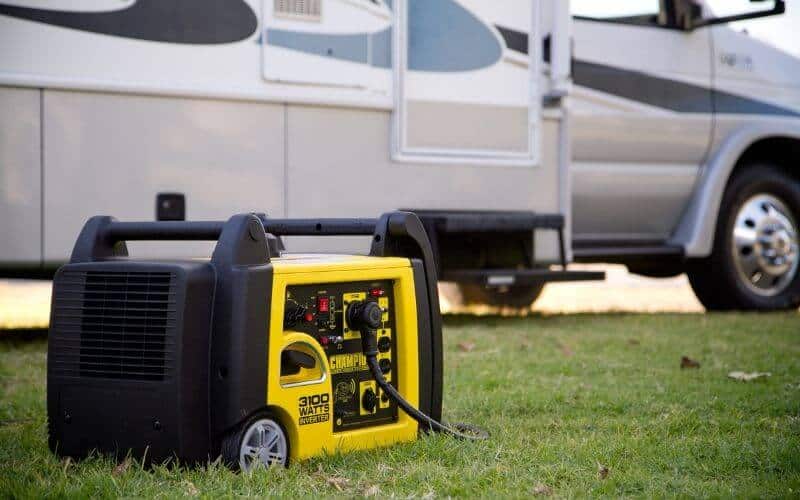
In this category, I think the Champion 7753i 3100-Watt is worth strong consideration when it comes to choose the best 30 Amp RV generator. It has a peak of 3,100 watts which is capable of powering your standard RV appliances.
It’s quiet compared to many of its competitors. It also has a quick touch panel with a special “Smart Economy” mode, which will save you money on fuel costs in the long run.
What Size Generator For A 50 Amp RV?
50 Amp is the next step up from 30 when it comes to power draw and demand. If you need to power a Class B motorhome or smaller is the Westinghouse iGen4500 is the one that I like the best.
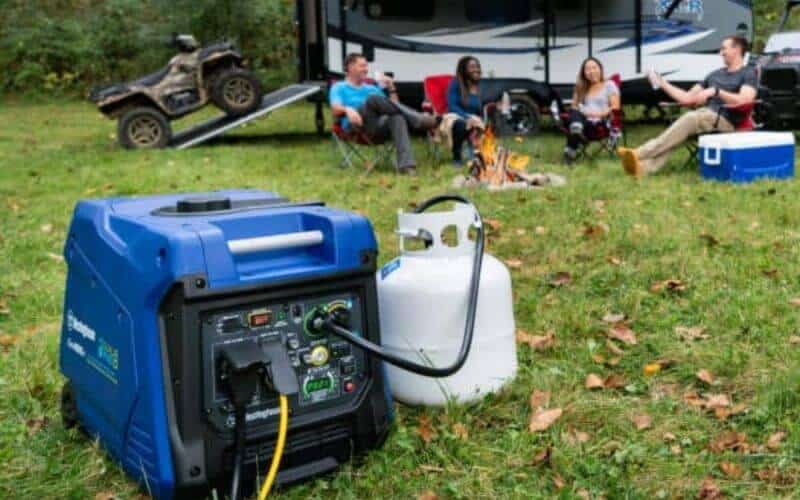
It has 4,500 Peak Watts with 3,700 Running Watts, which is enough to handle most modest size camper AC units.
Westinghouse designed the iGen4500 to be RV and Camper Ready, for easy installation.
It comes with 120V 30A Outlet (TT-30R) as well as an LED display. This includes information on remaining run time, current output, fuel level, volts, and lifetime hours.
Related: What Size Generator Do I Need for a 50 Amp RV?
Which Is Better A Gas Or Propane Generator?
There are pros and cons to both fuel types. This can help you decide which one is best for you and your intended style of RV camping.
Gas And Diesel Generator Pros
Gasolineand diesel are very common fuel sources that you can find at pretty much every truck stop in the United States.
Gasoline-powered generators tend to be a little smaller and lighter than their diesel brother, which makes them very portable and easy to carry.
Just keep in mind that with diesel you will see better energy efficiency. However, you will also pay more per gallon.
Larger generators sometimes come with accessory wheels, which you can use to move them around easier.
If your generator is a little on the heavy side for your tastes, and it doesn’t have wheels, you might want to consider strapping it to a handcart with a collapsible handle.
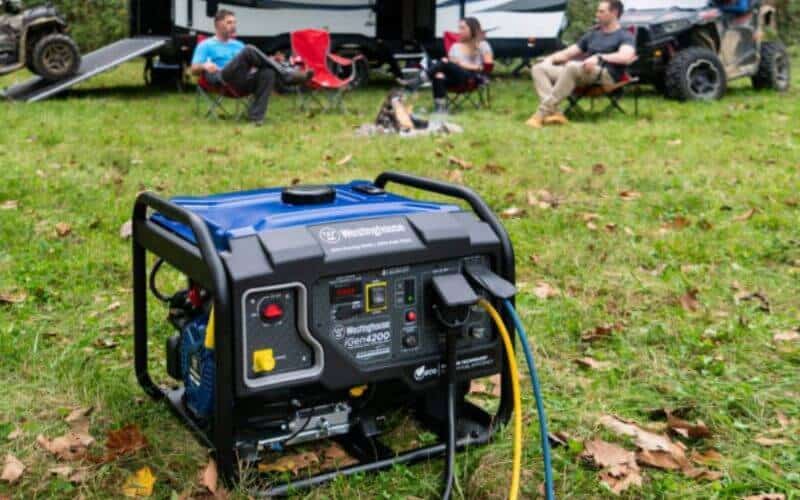
Gasoline and diesel generators also tend to be more efficient than propane generators.
They can also be used in an emergency or power outage to power your home.
Gasoline And Diesel Generator Cons
Let’s face it, gasoline and dieselare highly flammable. You also need to keep in mind that there are laws and regulations about how you refuel at a gas station.
This includes making sure that all heat sources are off, including the motorhome or camper’s internal propane system. You also need to turn the generator off before you refuel it.
Gasoline also has a limited shelf life of around 12-months. If you aren’t going to be using the generator for a while, such as in the winter, you should pour the correct ratio of fuel stabilizer into the gas tank.
With diesel, it can be prone to gelling up in the cold. If you are going to travel with your RV in the winter, or you will be visiting somewhere cold, you may need to pour some anti-gelling agent into the fuel tank.
This is especially a concern if you are thinking about using bio-diesel.
It’s also worth bearing in mind that gasoline and diesel both do not burn as cleanly as propane.
If you are going to use the generator to power things around a home base campsite, you might want to place the generator so it’s downwind of you and any neighbors.
Two-stroke gasoline generators are tempting. They tend to be a lower price than four-stroke gasoline motors and standard diesel generators.
However, they can be very loud, to the point where it will keep you up at night. Some of the larger ones might even require ear protection if you get near them.
Personally, when it comes to accessory gasoline generators for a campsite or RV vacation, I would stay away from anything with a two-stroke motor.
The Pros Of A Propane Generator
Propane at least at the commercial and retail level is a byproduct produced by refineries as they process crude oil. In a certain context, this means that its price is linked to the price of a barrel of oil.
At the same time, it also has a very long shelf life. If you don’t use it all up in one vacation, it is perfectly happy to sit there in the without degrading.
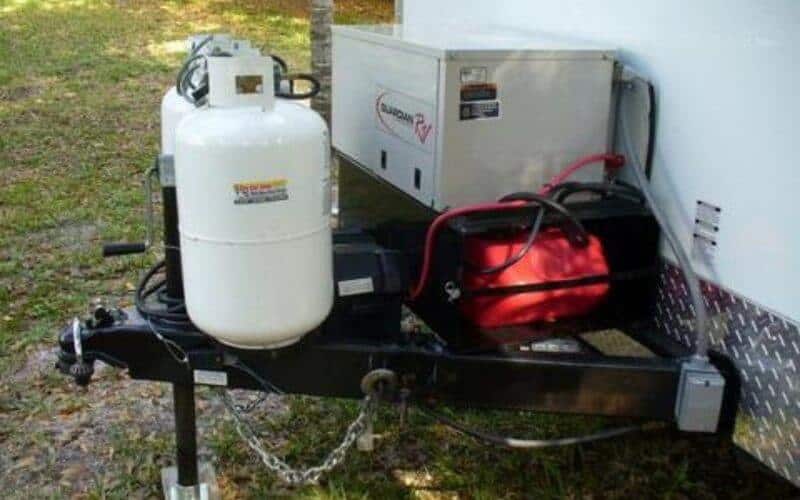
Propane also burns much cleaner than gasoline or diesel. So, you aren’t going to be bothered by the waft of the exhaust.
A propane generator is also much quieter than gasoline and diesel. This means you can have a larger one running in the campsite without being annoyed by all the clatter.
The Cons Of A Propane Generator
A propane generator can never quite run at full capacity and doesn’t really give you the start-up burst of a gasoline or diesel-powered generator.
You can compensate for this by choosing one that is rated a step or two higher than what you need. Which also translates into a higher upfront cost.
There are also a couple of things to consider when it comes to refilling your propane tank.
If you are using a medium-size tank like a 25 or 40-pound variety, you can find exchange refills at most major gas stations and retailers.
You simply hand them the empty tank and they hand you a new full tank at a discounted rate.
The problem here is that whatever is left in the old tank, is basically just wasted money.
If you buy two or three tanks and run each one stone dead before trading it in, you will be just fine.
If you are leaving a little in the tank each time, you are not getting as much value as it might seem.
Also, keep in mind that the pressure of liquid propane can be affected by temperature. If you are traveling in winter or someplace where it gets very cold overnight, the propane tank can lose pressure, of freeze up.
There have been many people on a cold night who switched over to a new tank, thinking the old one was empty, only to realize later that they just gave away 5 to 10 pounds of propane!
What Should I Look For When Shopping For A Portable Generator?
Once you have dialed in the wattage need and fuel type of generator you prefer, you can start shopping.
These days most of the high-end competitive brands pretty much stand shoulder to shoulder, with some minor bells and whistles between them.
However, there are a few that stand out in the crowd that is worth a closer look.
What Is A Good Small Generator?
If you are looking to power a small camper, toy hauler, or you just want to take a little bit of electricity with you, then you are a little bit spoiled for choice.
Honda has a strong, and well-deserved reputation in this niche, and they are certainly worth a good, hard look.
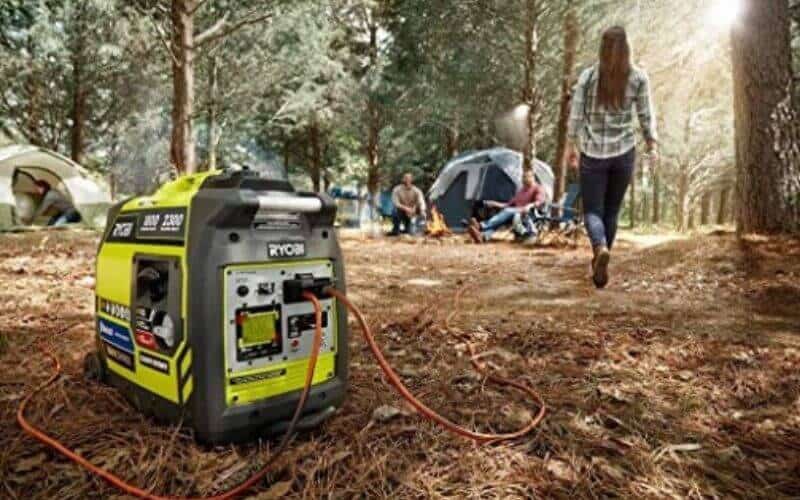
Another option that you should keep on your radar is the Ryobi RYI2300BTA, which is a 2,300 Watts, Bluetooth generator.
It can deliver up to 2,300 starting Watts with 1,800 Running Watts, and just like it’s Honda competition it is known to be very quiet. It has a pair of 120-volt outlets and 2 USB ports
The Ryobi RYI2300BTA also comes with a smartphone app that tells you the current fuel level, as well as estimated remaining run time.
It’s lightweight and very portable with dual rear wheels and surprisingly sturdy telescoping handle.
Does My Small Travel Trailer Or Toy Hauler Need A Generator?
People who are fans of “Roughing It” will tell you that you don’t necessarily need a generator to go camping.
This extends beyond the world of wall tents to things like popup campers, small travel trailers, and toy haulers that pull double duty as living accommodation.
While there are a great many people who have had a great time “Roughing It” without power, I think you still might want to consider adding a small generator to the mix.
Even something like the Ryobi RYI2300BTA will give you enough power on hand to do things like running lights around the campground, charging your phones and electronic devices as well as keeping electric coolers cold.
